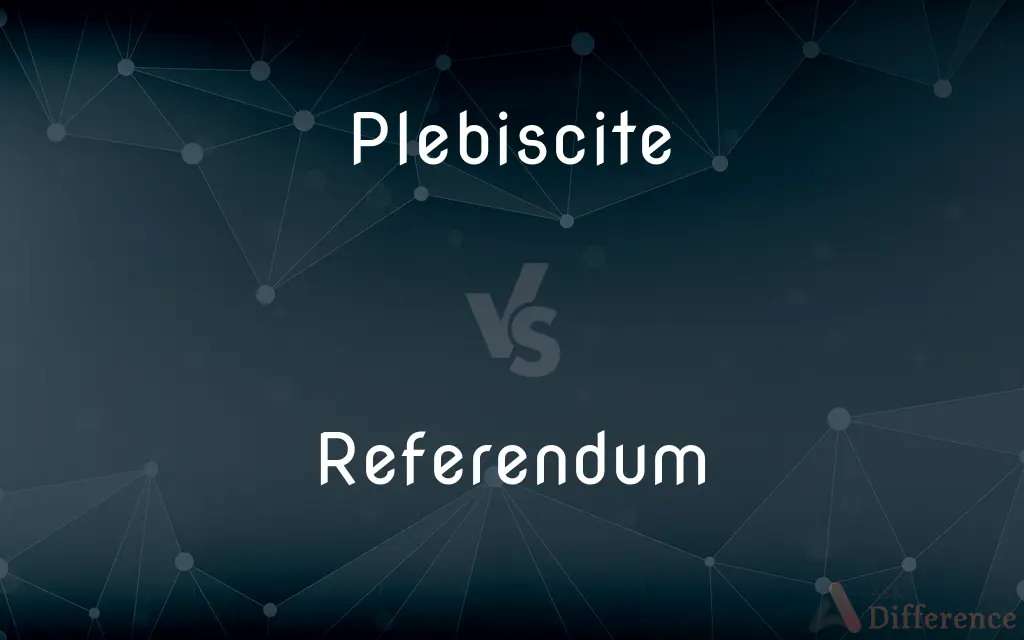Plebiscite vs. Referendum — What's the Difference?
By Tayyaba Rehman — Updated on September 16, 2023
A plebiscite is a direct vote by eligible citizens on an important public question, while a referendum is a general vote by the electorate on a single political question that has been referred to them for a decision.

Difference Between Plebiscite and Referendum
Table of Contents
ADVERTISEMENT
Key Differences
A plebiscite typically relates to significant national or regional issues, often involving territory or sovereignty. Conversely, a referendum can cover any range of political or legislative questions referred to the public by the government.
Plebiscites are sometimes seen as gauging the general sentiment of the populace on sensitive matters, without always having a binding effect. A referendum, on the other hand, often has direct implications, leading to legislative or constitutional amendments.
The terms plebiscite and referendum are sometimes used interchangeably. However, the former is more associated with larger geopolitical matters, whereas the latter might relate to specific policy changes.
An example of a plebiscite might be a vote on whether a region should become independent from a larger country. In contrast, a referendum could involve voting on a specific change to a country's constitution.
Both plebiscites and referendums are tools of direct democracy, allowing the public to participate in decision-making. However, the context and gravity of the issues they address often distinguish them.
ADVERTISEMENT
Comparison Chart
Definition
Direct vote on an issue, often sovereignty.
Direct vote on specific legislation or policy.
Scope
Generally broader issues.
More specific, legislative issues.
Legal Binding
May or may not be binding.
Often legally binding.
Frequency
Less common, usually significant matters.
More common, can be on routine issues.
Initiation
Usually by government during special circumstances.
By government or citizen petition.
Compare with Definitions
Plebiscite
A vote by the populace on a significant issue, often involving sovereignty.
The plebiscite on secession was highly contentious.
Referendum
A vote on a specific question posed for public judgment.
The referendum on the tax increase was defeated.
Plebiscite
A popular vote typically called to resolve a matter of public policy.
The plebiscite failed to resolve the issue of regional autonomy.
Referendum
A ballot measure put forth for public approval or rejection.
The referendum was put on the ballot after gathering enough signatures.
Plebiscite
A direct vote for expressing the will of the people on a specific issue.
The government announced a plebiscite on constitutional changes.
Referendum
A public vote to approve or disapprove a proposed law or amendment.
The referendum on the constitutional amendment was narrowly passed.
Plebiscite
A ballot in which the public casts yes-or-no votes on a political question.
A plebiscite was held to determine public opinion on the treaty.
Referendum
A legally binding vote on a particular issue.
The referendum resulted in the legalization of cannabis.
Plebiscite
A consultative vote where the outcome may not be legally binding.
The plebiscite served as an advisory tool for policymakers.
Referendum
A referendum (plural: referendums or less commonly referenda) is a direct vote by the electorate on a particular proposal or issue. This is in contrast to an issue being voted on by a representative.
Plebiscite
A direct vote in which the entire electorate is invited to accept or refuse a proposal
The new constitution was ratified in a plebiscite.
Referendum
The submission of a proposed public measure or actual statute to a direct popular vote.
Plebiscite
A vote in which a population exercises the right of national self-determination.
Referendum
Such a vote.
Plebiscite
A referendum, especially one that concerns changes in sovereignty
Referendum
A note from a diplomat to the diplomat's government requesting instructions.
Plebiscite
A vote by universal male suffrage; especially, in France, a popular vote, as first sanctioned by the National Constitution of 1791.
Plebiscite we have lately taken, in popular use, from the French.
Referendum
(politics) A direct popular vote on a proposed law or constitutional amendment. The adposition on is usually used before the related subject of the vote.
Plebiscite
A vote by the electorate determining public opinion on a question of national importance
Referendum
An action, choice, etc., which is perceived as passing judgment on another matter.
My father is taking my decision on whether to go to university as a referendum on his performance as a parent, and it's very stressful.
Referendum
A diplomatic agent's note asking for instructions from his government concerning a particular matter or point.
Referendum
The right to approve or reject by popular vote a meassure passed upon by a legislature.
Referendum
The principle or practice of referring measures passed upon by the legislative body to the body of voters, or electorate, for approval or rejection, as in the Swiss cantons (except Freiburg) and in various local governments in the United States, and also in the local option laws, etc.; also, the right to so approve or reject laws, or the vote by which this is done. Referendum is distinguished from the mandate, or instruction of representatives by the people, from direct government by the people, in which they initiate and make the laws by direct action without representation, and from a plebiscite, or popular vote taken on any measure proposed by a person or body having the initiative but not constituting a representative or constituent body.
Referendum
A legislative act is referred for final approval to a popular vote by the electorate
Referendum
A method of direct democracy allowing citizens to vote on legislation.
The state allows the use of referendum for certain policy matters.
Common Curiosities
Can citizens initiate a plebiscite?
Typically not. Plebiscites are usually initiated by a government.
Is a referendum legally binding?
Often, but not always. The legal binding nature of a referendum can vary by jurisdiction.
Are plebiscites common?
No, plebiscites are generally less common than referendums.
What is the public usually voting on in a referendum?
In a referendum, the public usually votes on specific pieces of legislation or policy proposals.
Can a referendum be initiated by citizens?
Yes, in some jurisdictions citizens can initiate a referendum via petitions.
Can plebiscites be on routine policy matters?
Typically, plebiscites are reserved for more significant, often existential issues.
What is a plebiscite usually used for?
Plebiscites are usually used for questions involving sovereignty or significant constitutional matters.
Can the result of a plebiscite be ignored?
Technically yes, as plebiscites may be consultative and not legally binding.
Are the terms plebiscite and referendum interchangeable?
While sometimes used interchangeably, they generally refer to different types of public votes.
Who usually calls for a plebiscite?
Usually, a government or governing body calls for a plebiscite.
How specific are the questions in a referendum?
Usually very specific, often concerning laws, amendments, or policy proposals.
What triggers a referendum?
Various triggers, including government decisions, legislative requirements, or citizen petitions.
Is a referendum a form of direct democracy?
Yes, a referendum is a mechanism of direct democracy.
Can a referendum be used to overturn a law?
Yes, a referendum can be used to repeal existing laws or amendments.
Can both plebiscites and referendums be divisive?
Yes, both can be divisive as they often touch on issues of public importance.
Share Your Discovery

Previous Comparison
Centromere vs. Kinetochore
Next Comparison
Flattery vs. ComplimentAuthor Spotlight
Written by
Tayyaba RehmanTayyaba Rehman is a distinguished writer, currently serving as a primary contributor to askdifference.com. As a researcher in semantics and etymology, Tayyaba's passion for the complexity of languages and their distinctions has found a perfect home on the platform. Tayyaba delves into the intricacies of language, distinguishing between commonly confused words and phrases, thereby providing clarity for readers worldwide.














































